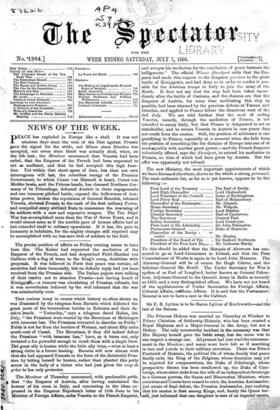The .Moniteur of Thursday announced, with pardonable pride, . that
" the Emperor of Austria, after having maintained the 44, honour of his arms in Italy, and concurring in the ideas ex- pressed in the Emperor Napoleon's letter of 11th June to his Minister of Foreign Affairs, cedes Venetia to the French Emperor, and accepts his mediation for the conclusion of peace between the belligerents." The official Wiener Abendpost adds that the Em- peror had made this request to the Emperor previous to the great battle of Kciniggrats, and had done so in order to render it pos- sible for the Austrian troops in Italy to join the army of the North. It does not say that the step had been taken imme- diately after the battle of Custozza, and the chances are that the Emperor of Austria, for some time meditating this step as possible, had been alarmed by the previous defeats at Turnau and Gitschin, and applied to France before the disastrous rout of the 3rd July. We are told further that the node of ceding Venetia, namely, through the mediation of France, is not intended to annoy Italy, but that France is designated to act as stakeholder, and to return Venetia to Austria in case peace does not result from the cession. Still, the position of arbitrator is one gratifying to France, especially at a moment when she falls from the position of something like the dictator of Europe into one of at mostsquality with another great power,—and the French Emperor voluntarily offered, says the Abendpost, to extend his mediation to Prussia, no hint of which had been given by Austria. But the offer was apparently not refused.






























